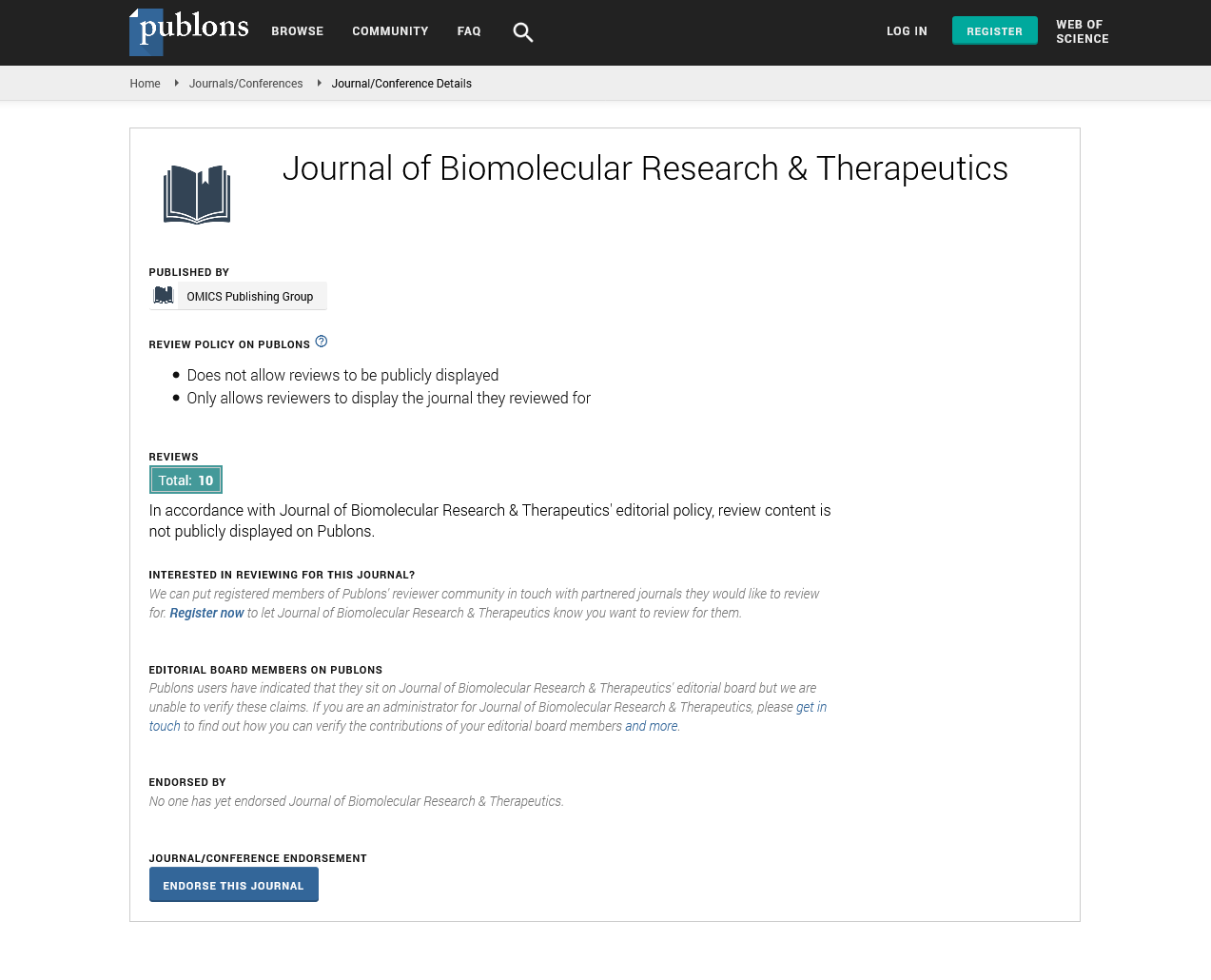Indexed In
- Open J Gate
- Genamics JournalSeek
- ResearchBible
- Electronic Journals Library
- RefSeek
- Hamdard University
- EBSCO A-Z
- OCLC- WorldCat
- SWB online catalog
- Virtual Library of Biology (vifabio)
- Publons
- Euro Pub
- Google Scholar
Useful Links
Share This Page
Journal Flyer

Open Access Journals
- Agri and Aquaculture
- Biochemistry
- Bioinformatics & Systems Biology
- Business & Management
- Chemistry
- Clinical Sciences
- Engineering
- Food & Nutrition
- General Science
- Genetics & Molecular Biology
- Immunology & Microbiology
- Medical Sciences
- Neuroscience & Psychology
- Nursing & Health Care
- Pharmaceutical Sciences
Commentary - (2024) Volume 13, Issue 6
Sustainable Solutions through the Fusion of Tradition Biotechnology
Xuan Tian*Received: 29-Nov-2024, Manuscript No. BOM-24-28350; Editor assigned: 02-Dec-2024, Pre QC No. BOM-24-28350 (PQ); Reviewed: 16-Dec-2024, QC No. BOM-24-28350; Revised: 23-Dec-2024, Manuscript No. BOM-24-28350 (R); Published: 30-Dec-2024, DOI: 10.35248/2167-7956.24.13.414
Description
In the face of mounting global challenges such as climate change, food insecurity and biodiversity loss, the need for innovative solutions has never been more urgent. Traditionally, societies have relied on indigenous knowledge and practices to address environmental and health issues. Over the last few decades, biotechnology has emerged as a powerful tool for addressing these challenges, utilizing the potential of genetics, microorganisms and advanced technologies to revolutionize industries such as agriculture, medicine and environmental management. However, in order to maximize the impact of these innovations, it is increasingly clear that integrating traditional knowledge with cutting-edge biotechnology can provide synergistic solutions that are both sustainable and scalable. This integrated approach could prove to be one of the most effective means for mitigating the global crises we face today.
Traditional knowledge refers to the wisdom, practices and innovations passed down through generations, particularly in indigenous and rural communities. This knowledge encompasses a wide range of topics, from agriculture to medicine and is often deeply embedded in the cultural, ecological and social fabric of communities. For instance, traditional agricultural practices such as crop rotation, companion planting and the use of organic fertilizers have sustained communities for centuries while minimizing harm to the environment. These practices are inherently sustainable, relying on local ecosystems and minimizing reliance on synthetic chemicals.
In the field of medicine, traditional remedies derived from plants, herbs and other natural resources have long been used to treat a variety of ailments. Many modern pharmaceuticals have been inspired by traditional medicines, with compounds such as aspirin (from willow bark) and the cancer drug paclitaxel (from the Pacific yew tree) serving as prime examples of how ancient knowledge has influenced modern scientific advancements. Traditional knowledge is also essential in environmental conservation, with indigenous communities often playing a central role in preserving biodiversity and maintaining ecosystems in harmony with nature.
Biotechnology involves the use of living organisms or their components to develop new products and processes. This can include everything from genetically modified crops to bioremediation techniques aimed at cleaning up polluted environments. In the context of agriculture, biotechnology has introduced Genetically Modified Organisms (GMOs) that are resistant to pests, diseases and environmental stressors, potentially increasing food production and reducing reliance on chemical pesticides. Additionally, biotechnology has facilitated the development of vaccines and therapies, including gene editing techniques like CRISPR, which hold immense promise for treating genetic disorders and even preventing diseases at the molecular level.
While biotechnology offers immense potential to address challenges such as food The integration of traditional knowledge with biotechnology offers the potential for creating more holistic, sustainable and culturally appropriate solutions to the challenges we face. One key example of this integration is in the field of sustainable agriculture. While biotechnology has led to the development of high-yield, drought-resistant crops, traditional farming practices, such as agroforestry and polyculture, can complement these biotechnological advancements by fostering biodiversity and enhancing soil health. Agroecological practices, which combine traditional farming techniques with modern biotechnology, can improve resilience to climate change, reduce the need for chemical inputs and promote long-term food security.
Conclusion
The integration of traditional knowledge and biotechnology holds immense promise for addressing some of the world’s most pressing challenges. By combining the sustainability and cultural relevance of traditional practices with the transformative potential of modern biotechnology, we can create innovative solutions that are both effective and ethical. For this integration to be successful, however, it requires collaboration, respect for local knowledge systems and a commitment to equitable outcomes. As we look to the future, it is clear that the fusion of tradition and technology will play a critical role in building a more sustainable, healthy and resilient world.
Citation: Tian X (2024). Sustainable Solutions through the Fusion of Tradition and Biotechnology. J Biomol Res Ther. 13:414.
Copyright: © 2024 Tian X. This is an open access article distributed under the terms of the Creative Commons Attribution License, which permits unrestricted use, distribution and reproduction in any medium, provided the original author and source are credited.

